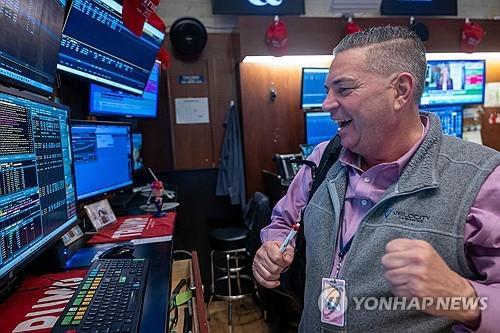
(New York=Yonhap Infomax) Jeong Ho Jin — The three major U.S. stock indices ended higher on Monday.
While investor sentiment toward Nvidia Corp. deteriorated early in the session, sending indices sharply lower, optimism surrounding artificial intelligence (AI) themes fueled a rebound by the close.
However, both Nvidia and Advanced Micro Devices Inc. (AMD) failed to recover, highlighting a divergence in sentiment even within the AI sector.
On November 25 (U.S. Eastern Time), the Dow Jones Industrial Average closed up 664.18 points, or 1.43%, at 47,112.45. The S&P 500 gained 60.76 points, or 0.91%, to finish at 6,765.88, while the Nasdaq Composite advanced 153.59 points, or 0.67%, to 23,025.59.
Market momentum was driven by continued disruption in the AI industry, following the launch and positive reception of Google’s Gemini 3.0 and the potential expansion of its Tensor Processing Unit (TPU).
The main catalyst was a report that Meta Platforms Inc. is considering purchasing Google’s TPUs. U.S. online media outlet The Information reported, “Meta is reviewing plans to introduce Google’s TPUs to its data centers by 2027.”
Meta, previously a major buyer of Nvidia’s graphics processing units (GPUs), is now reportedly exploring Google’s TPUs, a development that pressured Nvidia shares and lifted Alphabet Inc. (Google’s parent company).
Nvidia shares plunged more than 7% intraday on the news, before paring losses to close down 2.59%. The move signaled growing caution that the AI industry is not solely dependent on Nvidia. AMD also fell more than 4% on the day.
Among the so-called “Magnificent 7” tech giants, Nvidia was the only decliner. Alphabet rose over 1% on optimism for Google’s TPU, while Meta surged 3.78%.
Meta’s stock had dropped 20% in recent weeks following the announcement of large-scale capital expenditures and earnings concerns. The potential adoption of TPUs, which are less costly than GPUs, helped ease those concerns and supported the share price.
“If computing costs fall, consumption is likely to increase,” said Ron Albahari, Chief Investment Officer at LNW. “Meta’s move to purchase Google chips is a real-time example, and it’s a positive signal for the broader AI sector.”
Broadcom Inc., a leader in the custom AI chip (ASIC) market, also gained nearly 2% on expectations for the TPU market. Broadcom’s market capitalization now stands at $1.818 trillion, widening its lead over Tesla Inc. and Meta. The term “M7 excluding Broadcom” is becoming less relevant as Broadcom’s influence grows.
Key economic indicators supported expectations for a Federal Reserve rate cut in December.
The U.S. Producer Price Index (PPI) for September rose 0.3% month-on-month on a seasonally adjusted basis, matching market expectations.
U.S. retail sales for September increased 0.2% month-on-month, below the expected 0.4% gain. Compared to August’s 0.6% rise, the slowdown in consumption in September was more pronounced.
Slower consumption and moderate inflation could give the Fed more room to cut rates.
“Until last Friday, the probability of a December rate cut was reflected at 40%, but now it’s over 80%,” Albahari added. “I’ve never seen expectations shift so dramatically in just a few days, which shows how intensely the market is focused on this issue.”
By sector, healthcare rose more than 2%, while industrials, financials, consumer discretionary, materials, communication services, and consumer staples all posted gains.
As sentiment diverged within the tech sector, buying concentrated in blue chips and traditional industrial stocks, pushing the Dow up more than 1%. Of the 30 Dow components, 28 advanced, with only Nvidia and Chevron Corp. declining.
Optimism also spread on reports that Ukraine had agreed to a peace deal with Russia regarding the ongoing war.
U.S. President Donald Trump commented on the peace agreement, saying, “We believe we are very close to a deal.”
According to CME FedWatch Tool, the federal funds futures market is pricing in an 82.7% probability of a 25 basis point rate cut in December, compared to 84.4% at the previous close.
The CBOE Volatility Index (VIX) fell 1.96 points, or 9.55%, to 18.56.
jhjin@yna.co.kr
(End)
Copyright © Yonhap Infomax Unauthorized reproduction and redistribution prohibited.

